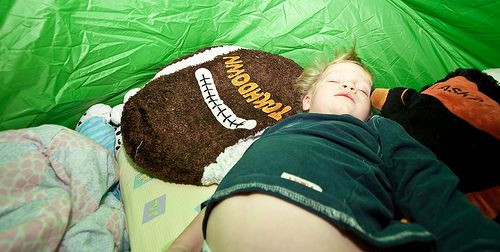Kids With Autism Have Trouble Sleeping: 1 In 10 Wakes At Least 3 Times A Night

Adolescents with autism spectrum disorder (ASD) often have trouble sleeping, a new study finds, confirming what parents of autistic children have long known — later nights and earlier mornings are often punctuated with bouts of restlessness during the night.
In the new study, the gap between non-autistic control participants and those diagnosed with the disorder was stark. A team of British and Canadian researchers conducted a longitudinal study of more than 14,000 children born in 1991-1992 in England, with parents providing data on their children from 6 months to 11.5 years old. The final analysis consisted of 39 children with an ASD and roughly 7,000 without one.
By the time kids had reached age 6 or 7, 10 percent were waking up at least three times per night. The children without the disorder woke up that often only .5 percent of the time.
"This study further documents what has long been reported and suspected,” Dr. Andrew Adesman, chief of developmental and behavioral pediatrics at Cohen Children's Medical Center, told HealthDay, “that children with an autism spectrum disorder have more sleep problems than do their peers."
Autism And Sleep
Autism spectrum disorder is a neurological disorder that arises in the first few years of a child’s life and affects his or her ability to socialize and pick up certain faculties of language. It includes autism, Asperger syndrome, and pervasive developmental disorder, not otherwise specified — typically abbreviated as PDD-NOS. Severity across children on the spectrum can range from slight difficulties in reading social cues (among Asperger sufferers) to extreme speech and cognitive impairments.
Much of ASD is shrouded in genetic secrecy, although scientists have slowly begun unveiling the condition as awareness grows. The latest study upholds prior research into sleep difficulties among ASD patients, reporting that many children with the disorder produce lower levels of the sleep hormone, melatonin.
The hormone is produced at night, according to the body’s natural circadian rhythms. Decreased melatonin production, be it through environmental or chemical factors, makes achieving a full, restful night sleep more difficult.
"If you ask people with autism, 'What is your biggest problem?' they will not say autism," Thomas Bourgeron, autism researcher and professor of genetics at the Institut Pasteur in Paris, said at a 2011 symposium on ASD. Rather, people with ASD cite sensory sensitivities or gastrointestinal woes. "And if you ask their parents, they will say sleep."
At night, an enzyme in the brain called acetyl serotonin methyl transferase (ASMT) helps convert serotonin, a chemical messenger, to melatonin. A 2008 study carried out by Bourgeron showed that people with ASD more often carry a mutation in their ASMT, and have substantially less ASMT and melatonin in their blood compared with controls.
The difference was not marginal. "This was a huge, huge, huge decrease," Bourgeron said.
Why, exactly, melatonin levels are so much lower in ASD patients than non-sufferers remains a mystery. Bourgeon is hesitant to draw a link to genetics. He believes the problem has different roots.
"The challenge is not at the genetic level, the challenge is at the phenotypic level, for sure," he said. "We will do our best to find some correlation."
What Parents Take Away
As for how the disorder affects kids with ASD, the latest study sheds a helpful light. Sleep disruptions typically arose during normal sleeping hours, due in large part to irregular sleep patterns. From age 30 months to 11.5 years, kids slept for 17-43 minutes less each day if they had ASD than if they didn’t. They had trouble falling asleep and tended to wake up earlier.
Adesman conceded that the study does not draw a link between ASD and behavioral problems resulting from sustained sleep loss, even though he acknowledged each part of the link exists.
The chemical challenges may be compounded by environmental inconsistencies. If a child with ASD requires certain rituals at night, such as being rocked to sleep or sung a lullaby, waking up from poor melatonin production means the child must fall back asleep on his or her own. Barring a daily melatonin supplement, one way to overcome a child’s irregular sleep schedule is through active, concerted means.
“One of the most important steps parents can take is to keep a sleep diary, keeping track of time of sleep and number of nighttime awakenings,” notes Caroline Eggerding, M.D., of Cooper University Health Care. “A sleep diary allows families to become aware of patterns and environmental situations that may be inadvertently contributing to sleep problems and to monitor progress.”
Source: Humphreys J, Gringras P, Blair P. Sleep patterns in children with autistic spectrum disorders: a prospective cohort study. Archives of Disease in Childhood. 2013.
Published by Medicaldaily.com



























